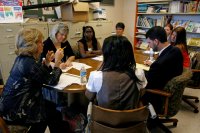The Benefits of Inquiry-Based PD
Giving teachers control over their professional development work boosts engagement and models a practice they can use in the classroom.
Your content has been saved!
Go to My Saved Content.In her blog The Teaching Experiment, Carla Meyrink, founder of a small school in the Dominican Republic, describes how her team is using an inquiry-based structure to guide their professional development.
“We chose inquiry-based PD because not only would teachers have a great deal of control over their learning, but they would experience inquiry learning in action, a strategy that we’d like to see them use more of in their classes,” Meyrink writes.
The school identified two areas of focus—differentiation and engagement—and surveyed teachers about their interests in those areas. Using the information gathered from the surveys, school leaders created eight categories of possible inquiry. They then gathered resources—books, articles, podcasts, and websites—for each category, and at the first meeting, teachers browsed through the resources, chose which category they wanted to focus on, and divided into groups based on the categories.
Using the Question Formulation Technique, teachers brainstormed key questions to drive their inquiry, which provided them with autonomy and ownership of the process.
Meyrink outlines a five-step process for the inquiry cycle her school’s teams are using:
- Conduct research about the proposed question.
- Devise a plan of action to implement in the classroom.
- Reflect on the implementation and assess how well it worked.
- Iterate and make changes to the plan as needed.
- Formulate a new question based on the knowledge gained and begin the process again.
Meyrick suggests allowing ample time for research, both during the allocated PD meeting time and between meetings. As teachers test out their theories in the classroom, give them opportunities to assess what worked and what didn’t. At Meyrink’s school, after teachers “tried out their new strategies, they reflected on whether or not they had been successful.” Encourage teachers to share their findings and reflections.
